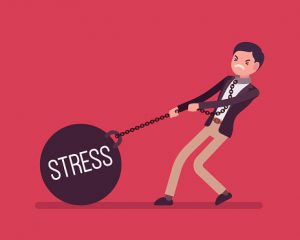 Everyone experiences stress from time to time, whether it’s short term stress (acute), such as when someone cuts you off in traffic or when dealing with a difficult client at work, or long-term stress (chronic), like when going through a lengthy divorce or working in hostile conditions. While these may be things we just have to deal with, they can lead to temporary or potentially long-term health problems that can affect your quality of life down the line.
Everyone experiences stress from time to time, whether it’s short term stress (acute), such as when someone cuts you off in traffic or when dealing with a difficult client at work, or long-term stress (chronic), like when going through a lengthy divorce or working in hostile conditions. While these may be things we just have to deal with, they can lead to temporary or potentially long-term health problems that can affect your quality of life down the line.
While short bursts of stress are not too worrisome and serve as a minor nuisance, over time, acute bouts of stress can become a more long-term source of stress for an individual. Mental health experts call this handling of acute stress resilience: how quickly you recover from an acute episode of stress. During these moments, blood pressure, heart rate, breathing rate, and level of muscle tension may increase substantially for a short duration. These markers of stress are typically transient and quick to disappear in younger and generally healthy individuals. Experiencing acute stress may actually be exhilarating or exciting and have an instinctually protective purpose, as it causes you to become hyper aware of your surroundings during particularly stressful moments and is perhaps the deciding factor when you experience a fatal accident and escape.
Advertisement
Chronic stress is when you are faced with a constant state of uneasiness or unrest, leaving your body distressed most of the time. Your body is not good at handling great deals of stress over long periods of time, as it will gradually start increasing your heart rate, blood pressure, breathing rate, and levels of muscle tension, resulting in the body having to work harder in order to maintain normalcy. This constant stress can lead to some detrimental health consequences over time, such as muscle twitching, peptic ulcers, and even heart disease.
Chronic stress can come in a multitude of forms but tends to occur due to unrelenting demand and pressure for seemingly endless periods of time. The individual often gives up all hope of ever reaching a solution and succumbs to living a stressful life. Past traumatic experiences can contribute to your stress, making it feel as if you’ve fallen into a deep hole with no way of getting out.
What people have to recognize is that they have control over their emotions and how they feel, and part of that is achieved by improving coping skills and learning how to deal with stressful situations. Exercise, yoga, or even simple relaxation techniques can be the stepping stone to finding relief from daily stressors. This may only go so far with some individuals, however, as not all problems can be solved that simply. It is recommended that those with deep emotional trauma seek out professional help, as your well-being should be at the top of your priority list.
Related: Tips to reduce stress
